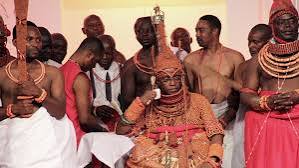The Oba of Benin Palace is the most sacred and prestigious place in Benin, home of the Oba of Benin and other royal rulers. The palace is built by Oba Ewedo (1255AD – 1280AD), rebuilt by Oba Eweka II (1914 – 1932) after the 1897 war. The palace was declared a UNESCO Listed Heritage Site in 1999.
Before visiting the Oba’s Palace, there are some few things you should know aren’t allowed in the palace. Whether you are an indigene or not, you should take note of these six things which includes:
Whistling
Although it may seem harmless and not offensive, whistling in the benin kingdom, particularly at the Oba’s palace is considered rude and hence not allowed. Based on superstition, many believe that whistling is a medium through which mortals can summon spirits and the dead. The Oba’s palace houses over 3,000 deities (seen and unseen), and it is believed that when a person whistles in the palace, there is no control over which spirit or deity would be roused by the call, which can lead to a harrowing situation.
Pointing
Pointing is seen as an act with deep spiritual meaning, and so, pointing fingers at either the Oba or his chiefs are not allowed at the Oba’s palace. Anyone who does this is immediately arrested by the security guards of the palace for questioning and possible punishment. The Oba himself does not point fingers at anyone, except in a bid to bless or curse another individual.
Open umbrella during festivals
The Oba of Benin is the only person whose head can be covered with an umbrella during major festivals like the Igue festival. Palace chiefs are expected to leave their umbrellas at the palace gate during festivals, and if tourists or visitors are unaware of this rule, the Ifiento security guards will issue a warning at the entrance. If you are travelling to Benin and intend to attend a festival, be ready to endure any weather conditions without the use of an umbrella.
Black apparel
Many cultures use black as a colour to symbolise grief. The Oba cannot see the colour black since it is forbidden for him to grieve, regardless of the situation. Anyone wearing black clothing is therefore prohibited from entering the palace, particularly if they intend to meet with the Oba or have a high chance of crossing paths with the oba.
Male visitors to the royal harem
The royal harem is off-limits to any male visitors. a place designated to the queens, and concubines of the Oba. The members of the harem, particularly the queen, are prohibited from even touching their father or brother because of this strict rule. The royal family’s selected male children are the only men permitted to enter the harem.
Banga (palm oil fruits) on the head
Although Banga soup is a popular dish in Benin City, it is officially forbidden to carry the palm oil fruit, which is its source, on your head within the palace. Additionally, it is forbidden to drive through the streets around the Oba’s palace with a vehicle loaded with palm oil fruit. It is thought that the palm fruits at the Oba’s palace or nearby signify that the earth will absorb blood, and typically someone nearby would have to perish. The palm kernel is typically crimson, the same colour as blood. It is seen as an omen and a terrible sign. An animal is effectively sacrificed to the Ogun Oba as soon as someone—possibly a guest—does not follow this regulation.


